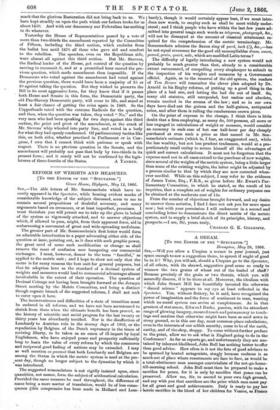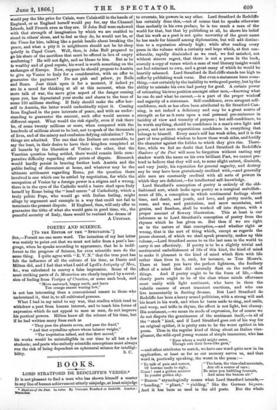A DREAM.
[To THE EDITOR OF THE "SPECTATOR."]
Brompton, May 28, 1866. you allow a Utopian a corner in your journal, just space enough to sow a suggestion there, to sprout if aught of good be in it? Why, you will ask, should a Utopian go to the Spectator, of all others, with its shrewd, suggestive good sense so ready to winnow the two grains of wheat out of the bushel of chaff? Because precisely of the grain or two therein, which you . will assuredly discern, if it be there at all. Moreover, the idealism with which John Stuart Mill has beautifully invested the otherwise "dismal science" appears to my eye at least reflected in the Spectator. You, without flattery, be it said, have recognized the power of imagination and the force of sentiment in man, wanting which no social system can arrive at completeness. As in that greatest of statesmen, Edmund Burke, passion, with its attendant range of glowing imagery, ensured reach and permanency to teach- ings and maxims that otherwise might have been as seed sown in stony ground, so in this our day, most common-place calculations, even in the interests of our selfish security, cease to be of the earth, earthy, and of the shop, shoppy. To come without further preface to the point, allow me to ask what is England going to do in the Conference? As far as reports go, and unfortunately they are sus- tained by inherent likelihood, John Bull has nothing better to offer than good advice. How often is it not the fate of good advisers to be spurned by heated antagonists, aim& because coolness is as much out of place where resentments are face to face, as would be a total-abstinence man amongst convivialists of the not-go-home- till-morning school. John Bull must then be prepared to make a sacrifice for peace, for it is only by sacrifice that peace can be preserved. Allow me, Sir, to ascend to your own high ground, and say with you that sacrifices are the price which men must pay. for all great and good achievements. Italy is ready to pay her a heroic sacrifice in the blood of her children for Venice, as France
would pay the like price for Calais, were Calais still in the hands of England, or as England herself would pay for, say the Channel Islands, half French even as they are. If John Bull were endowed with that strength of imagination by which we are enabled to stand in others' shoes, and to feel as they do, he would not be, or the Times for him, talking like a parish beadle about breaking the peace, and what a pity it is neighbours should not be let sleep quietly in Capel Court. Well, then, is John Bull prepared to go his share of the sacrifices that must be offered in lieu of empty conferring ? He will not fight, and no blame to him. But as he is wealthy and of good repute, his word is worth something on the exchanges of Europe. Now, suppose he should propose to Austria to give up Venice to Italy for a consideration, with an offer to guarantee the payment? Do not pish and pshaw, ye Bulls and Bears. Just think upon it for a moment, if indeed ye are in a mood for thinking at all at this moment, when the mere talk of war, the mere grim aspect of the danger coming upon you, has depreciated your stocks and shares to the tune of some 150 millions sterling. If Italy should make the offer her- self to Austria, the latter would undoubtedly reject it. Coming from England in the pure interests of peace, and with an under- standing to guarantee the amount, such offer would assume a different aspect. What would the risk signify, even if risk there be, of some twenty millions or more, when compared with the hundreds of millions about to be lost, not to speak of the thousands of lives, and of the misery and confusion defying calculation? Two things are admitted. The one that the Italians are excusable, to say the least, in their desire to have their kingdom completed at all hazards by the liberation of Venice ; the other, that the Venetian question being settled, there'would remain little com- parative difficulty regarding other points of dispute. Bismarck would hardly persist in braving further both Austria and the public feeling of discontent at home, and whatever may be the ultimate settlement regarding Rome, yet the question there involved is one which can be settled by negotiation, for while the occupation of Venice by a foreign power is a stigma and a wrong, there is in the eyes of the Catholic world a lustre shed upon Italy herself by Rome being the "head centre" of Catholicity, which a truly politic Pope, who would go with Italian feeling, might allege by argument and example in a way that could not fail to terminate the present dispute. If England, then, will only offer to guarantee the tithe of what she would gain in good time, viz., the peaceful security of Italy, there would be realized the dream of
A UTOPIAN.































 Previous page
Previous page